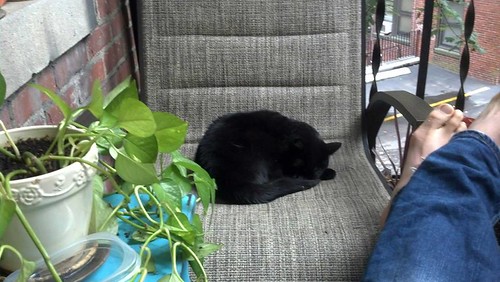Finding Your Niche as a Trainer or Coach
Not to rub it in or anything, but as I type these words I’m sitting poolside here in the Dominican Republic.
I’m on vacation!!!!
And while yes, I snaked away for a little bit to hop on the internet for a few minutes…….it’s all good, because Lisa is currently enjoying a cocktail…..;o)
We arrived here this past Saturday afternoon, and since then it’s been nothing but beach, pool, naps, and lots of delicious local delicacies (that is: if you consider an all-you-can-eat-ice-cream-buffet a delicacy.) Holla!
It’s been an amazing trip so far. Every morning Lisa and I have been getting up early to move around a little – this morning it was sprints on the beach (the old men walking around in their Speedos were big fans of Lisa) – and the rest of our days are spent doing whatever the heck we want. Hitting up the buffet, going for walks, reading on the beach or poolside, and people watching. OMG – the people watching is EPIC.
Life is hard.
Nevertheless, I planned a head beforehand, and made sure I was still going to be able to provide some content while I was away. Ie: I bribed a few friends to fill in while I was away…..
Today I have a guest post Michael Anderson.
Enjoy!
I know that this post won’t apply to everyone who reads Tony’s blog, and that’s ok.
I know there are a TON of trainers and coaches (both new and seasoned) who read this blog for insight into training, exercise and maybe one of roughly seven million adorable picture of Dagny sleeping that Tony has saved on his computer.
Note from TG: Well, since you asked……..

My topic today is going to be aimed at those new fitness professionals; I want to talk a little bit about how to “find your way” in this crazy world we call Fitness.
I found this industry a little bit late; I went back to school for Exercise and Health Science at 25 and just knew that I wanted to work with pro athletes.
I couldn’t see myself doing anything besides working with the Celtics and training Paul Pierce. Then, I moved on to thinking that the University setting was where I wanted to be; there’d be nothing cooler than being in a college weight room all day.
I’ve worked with athletes at every level (Olympic -> little kids) as well as every variety of general population client in multiple settings (even a gasp CrossFit gym), so I think I’ve developed some insights that will help you out.
Professional Sports
This is where everyone thinks they want to go, which is why it kind of sucks. You’ve got a thousand people applying for the same assistant strength coach job with a pro team, so they will take whoever is willing to work for the least amount of money.
If you’re actually able to get that job, you’re following whatever program the head coach is writing or you’re over-seeing the veterans while they do what they “know” is best for them after years of weight training.
Head coach jobs don’t open up very often, so you end up being an assistant or associate coach for a long time.
On the awesome side, you’re working with the best of the best. You get to see how elite athletes train and how they move on a daily basis. Watching this sort of thing gives you an amazing insight into what great movement looks like and what sort of training works with athletes of this caliber.
I’ve been consistently surprised at what athletes of this caliber are actually doing (right or wrong) in the weight room.
College Athletics
I spent a year at Boston University Strength and Conditioning, and loved it.
I got to be around high level athletes on a daily basis and worked with a really strong group of coaches. The athletes we had there didn’t have the entitled sense of “I’ve made it”, even the Olympians we had in the gym.
These are athletes who come in to work hard and understand what strength and conditioning can bring them.
You also have a ton of “touches” with athletes so you have space to experiment and see what works with different athletes at different times of the year; some of the coolest new research comes from college strength and conditioning.
The downside is the amount of red tape you deal with in the college setting (rules, regulations, sport coaches, sports med, blah blah) and the limited amount of time you actually end up seeing these athletes in the weight room. Like pro sports, the money isn’t fantastic because everyone wants to work there, and the room for growth can be limited because people don’t vacate their jobs very often.
High School Sports
This can be a really cool position to hold, but tough to find.
There’s not a ton of money in most high schools, so you have to tailor your search. A lot of high schools don’t even have real weight rooms, so finding a job is tough. The ones that do, though, can be really rewarding and fun places to work.
My buddy went to a local private school with one of the best-equipped weight rooms anyone has ever seen, with a powerlifting team and a coach who uses the Westside Barbell system with fantastic success.
For most people this wouldn’t constitute a full-time job, but would make a great addition another coaching/training position. One of the downsides is that you get high school athletes and end up spending a lot of time teaching the basics over and over, and all the athletes end up leaving you before you get to see them at their best.
Private Facility
I currently work in a private training facility (THIS ONE) and it’s pretty cool.
We work primarily with post grad (prep year) and high school athletes and see a lot of regional kids after school.
Being in a private facility allows you to do whatever kind of training you want with the athletes and you don’t have to adhere to the rules/regulations of a college or a pro team. It also allows you to reach a broader range of people then you do in any other setting; you can get pro athletes, semi-pro, recreational, high school and just normal general population people all training together under one roof.
The downside, as the CP guys would attest to, is that it is a business at the end of the day.
You have to be sure enough that you’re as good as you say you are and then worry about where to get the clients from.
To open a private facility takes time, patience and money. Getting a job in one means you have to be really good. These places run off of their reputation and tend to hire very carefully. If you get to work at a good one, chances are high that you’ll get to see/work with some pretty high level athletes.
CrossFit Gym
Yeah, I’m including this too. Deal with it.
One of my best friends runs a CrossFit gym and I’ve coached some classes for him and loved it.
I wrote a blog post (HERE) on my own site about the direction that I feel CrossFit is headed.
While there are still very “CrossFit-y” gyms out there, there are quite a few headed in a much more traditional strength and conditioning direction.
Working in the right CrossFit gym is sort of a “best of both worlds” scenario: you get access to all of the fun toys that hardcore strength gyms have, but you get to work with gen pop clients that will be really grateful for the help you’re giving them.
When you’re doing this day in and day out for years, you come to really appreciate what it means to change someone’s life and have them be grateful for it. One of the other good things is that CF gyms tend to pay full-time coaches a little bit better than other gyms do.
The downside is that the market is so saturated that it’s tough to separate yourself from the herd; which is something I think will change soon. You also can’t stray too far from the CrossFit brand because that is what will bring people into the door in the first place. But if you know a CrossFit gym with good programming and coaches that you trust, it’s a pretty cool place to work.
Commercial Gyms
We have all done it.
Regular ol’ gyms are where you need to cut your teeth a little bit in this industry.
I personally learned a TON about myself, my style of training and how to get people to understand what they need to do to achieve their goals.
You can talk at someone till Tony pulls 600, but if you can’t make them understand then it’s not worth squat.
It can either suck or be awesome, depending on the gym that you’re in. It’s become more and more common to have big commercial gyms that have a room full of fun toys, but still have stairmasters and arc trainers out front.
In a facility like this, I could have a solid little career.
In a place where you’re not allowed to deadlift or make noise or have fun, it’s a little bit tougher.
At the end of the day, being in a place like this comes down to who your co-workers are and whom you’re training. I was lucky during my commercial gym career: I had some amazing co-workers and I trained some really fantastic people with whom I had great success. Don’t count out commercial gyms, there are some good ones out there.
Conclusion
There’s no perfect situation for anybody, that’s why we have all these options. In my humble opinion, I’d say that the most important factors you should consider when finding your place in this industry is your co-workers and clients.
Don’t ever catch yourself thinking that you’re “too good” to work with normal Joes or that it’s beneath you or you’ll spend a lot of time trying to get somewhere that you might not even like.
Have a great day and go lift some heavy shit!
Author’s Bio
I was an asshat and forgot to ask Mike to send his updated bio. Until he does you can reach him with any questions, comments or notes of affection at michaelkaneanderson@gmail.com. You can also visit his website: http://commercialgymtrainer.blogspot.com/



Comments for This Entry
Best Posts of 2014 - Guest Posts
[…] Finding Your Niche As a Trainer or Coach - Michael Anderson […]December 26, 2014 at 7:30 am |